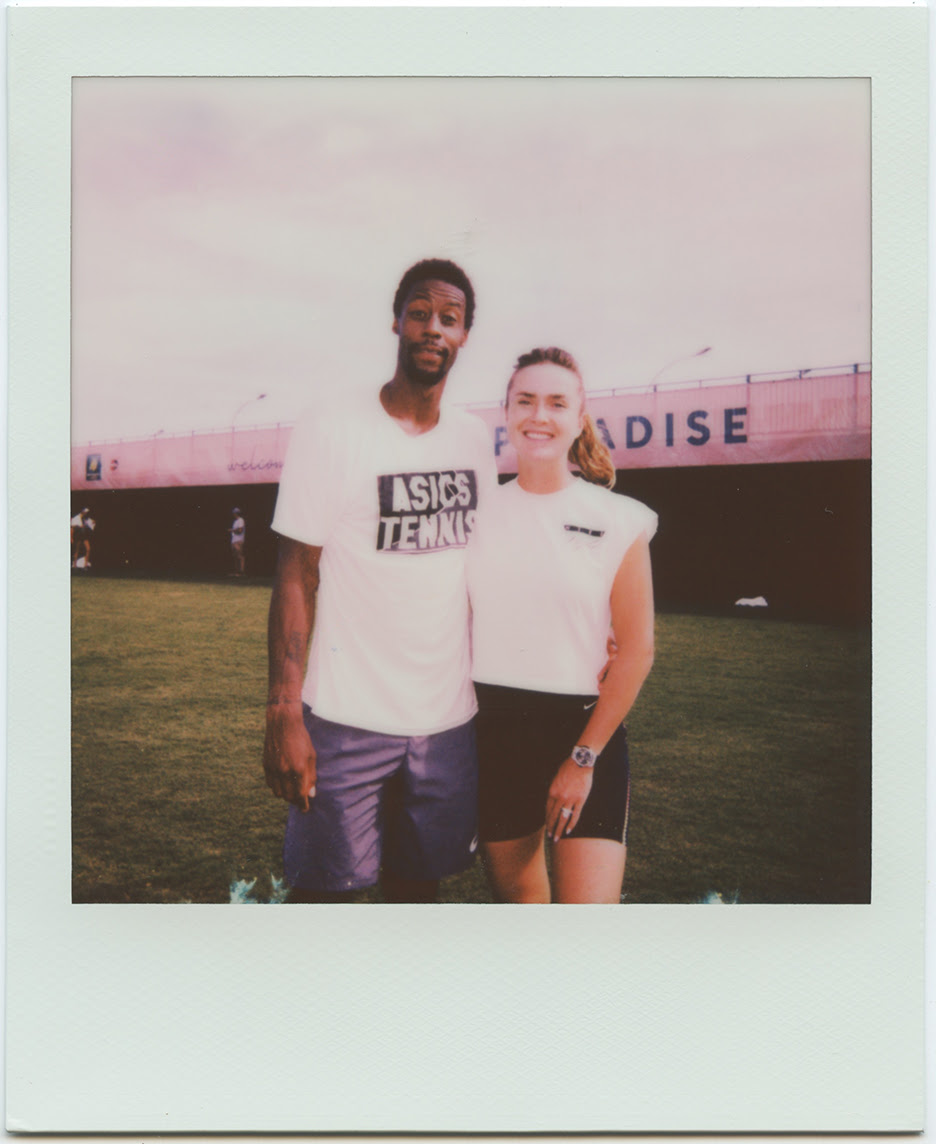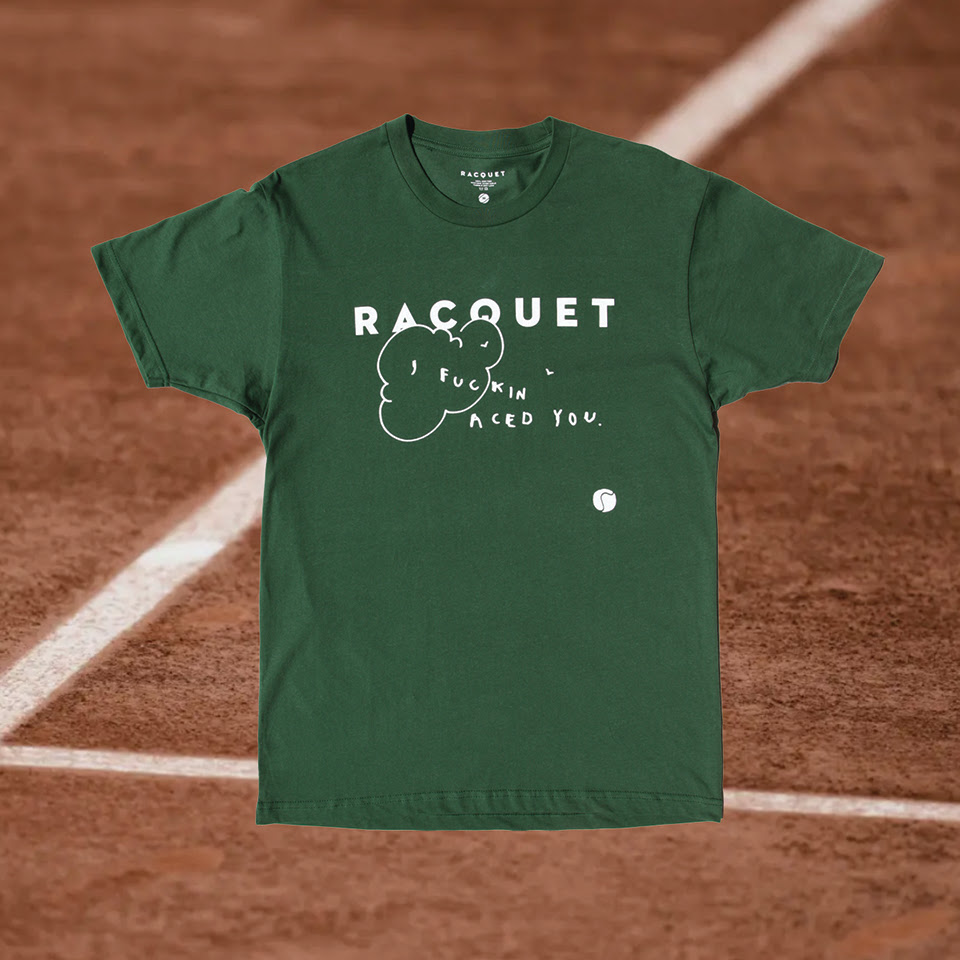By Ben Rothenberg
Gael Monfils was the story of the first round of this year’s French Open, coming back from 0–4, 0–40 down in the fifth set to beat Sebastian Baez in an epic win. Monfils called it one of the best wins of his career, but it was an ending more than a beginning: He had to withdraw from the tournament before his second round due to lingering wrist pain, one of several injuries that have bedeviled him in recent years.
Monfils, 36, returns to competition this week in Washington, where he was a champion in 2016. Before his first match, Monfils sat down with Racquet to discuss his current motivation, his wife Elina Svitolina, and the perceptions that he cares more about having fun than winning.
This interview has been lightly edited and condensed.
Racquet: Your last match was the match at Roland-Garros against Baez, which I think you said was one of the top two matches of your career at the time, that epic comeback. Is it easier or harder having your last impression of being on a match court be that great moment? Does that make it harder to stop then or easier to have that as your most recent taste of tennis?
Gael Monfils: It’s actually a good question, you know? I don’t really know. At that time, I know that moment felt magical and unbelievable. At that moment there was a lot going on in my mind: trying to be in shape for Roland-Garros; haven’t played so much; try to find this momentum back into the winning circle. So it’s always unbelievable to have those matches under your belt. Inside of me I hope it’s not the last one. I hope I will have—I won’t say “plenty”—but, a lot. But as I say, I can’t tell you. It is good to have it. And I hope I will have a few more before I stop.
Racquet: But you feel that uncertainty, I guess. You don’t know.
Gael Monfils: Yeah, I don’t know. Because of many things. Age. As I always said, comeback after an injury is demanding mentally and physically. Physically, of course, we are all ready to work and be disciplined, but mentally, to get back again into this hard process when you get older is tougher. And then also, the youngsters are playing really good. It’s really tough to be out there and compete with them. So I hope it’s going to be a few years, but it can be shorter than that as well. So I’m prepared for both sides.
Racquet: What inspires you to keep going? What are you still trying to find or feel in tennis?
Gael Monfils: I think I feel that I have enjoyed myself a lot. I really feel tennis is a joy. It’s my joy space. I really like to be out there playing big matches. I feel I can still compete on big moments and I think this is driving my motivation to try to be out there, try to clinch one or two other big wins. That brings the motivation, and still the fire is burning.
Racquet: So it’s more about moments than goals or accomplishments, is that fair?
Gael Monfils: When you say “goals,” you mean…
Racquet: Well, do you have anything you feel like, “I have never done this, I’ve never won that, I still want to do something new to prove something to myself.” Or is it more just about the sensations?
Gael Monfils: Well, I would say I’ve never won the tournament at this age, so it would be cool to have a tournament at this stage of the career. It would be nice. Other goals than that, it’s a bit different for me; it’s to get back to a good level and then also bodywise that I can compete week after week. One hundred percent, week after week, it would be nice.
Racquet: To talk about inspiration, watching your wife at Wimbledon was pretty incredible. What was that like for you, seeing her from afar?
Gael Monfils: Great. Great, because I see how much discipline she put in to get back to this level, all the ups and downs. It’s always beautiful to see from the inside. Of course it’s inspiration for many people, and even myself. I feel like that energy, that intensity, it’s nice to see. And of course, I was super proud of her.

Racquet: How different does she seem as a player and as a person, even just since when you first met her? Because it seemed like, for me watching her and following her as a journalist for years in her career, she has a different energy, a different spirit, a different motivation, a different purpose now, which I can sense even just watching. Do you sense that too, that it’s a different energy from how it was when you first met?
Gael Monfils: Of course. But it’s more in the private things in a way, because it just starts that she’s the girl that you really like and you hang out with, and then she becomes your wife. So it’s just different, and now she’s a mother. And this—this makes it really different. And then I think from her own view and perspective, it’s a little bit different, maybe less pressure that she puts on herself: She has a family, and I think she’s growing up as well. So of course it’s completely different from the girl I started dating.
I always see her as a powerful woman. She decides for herself what she does in life. And this is a little bit more personal, but when we got to the decision that we wanted to have a kid, it was a powerful decision, because it’s a pause: You pause your career as a woman. And this shows me also again how strong she could be. Because it’s not an easy decision, I think, when you’re on top of the game, even with love and desire to have a family, to do it. And when she did it, I was like, wow. I was obviously amazed.
And unfortunately with the war, it’s amazing the strength that she can pull out for her country, which is suffering. At the beginning, I think she mentioned it wasn’t easy at all for her because she has family there. There was this fear and anxiety that she had every day. So my role was to be there so she could lean on me a little bit, as much as she wants. I try to be there for my wife. We are a team, and I know she has her down moments. I try just to be there and be the strong rock for her when she needs it.
Racquet: I know you’re popular everywhere you go, but I think from watching you in these places, it seems like you have a special connection with cities like Washington and New York, these cities that have the big Black populations in the U.S., especially. It seems like the crowds come out for you. I remember very clearly when you played Isner in New York in 2013, 10 years ago or so, and the crowd was cheering for you. And he was the American No. 1 at that time, and I think he was kind of shocked by this. What is your connection to playing in America? I know obviously you put on shows; how do you find the American audience in receiving of that?
Gael Monfils: They are unbelievable. It’s a lot of energy. I always said the experiences that I had with the American crowd are always unbelievable. I remember one of my last matches here, at the US Open against Sinner, was crazy. The atmosphere was crazy. I feel—and I’ve felt—always welcome here. And I always try my best here. It’s a little bit for me like playing in Paris; it’s kind of the same. It’s just insane. I can’t say enough thanks to the people, because the energy and the love they bring me, it’s crazy.
Racquet: I feel like you bring that to them too.
Gael Monfils: I try.
Racquet: But do you sense that you give a lot? I feel like you give a lot to crowds. Like you’re very aware that there’s people there to see tennis, and your focus is not only, for better or worse, on just trying to win.
Gael Monfils: No, I always want to win. But the thing is, maybe, I had a different view. I don’t say mine is better, but I always want to win and just be me and enjoy myself. And I feel it’s good that you mentioned it, because people [forget] sometimes that you can enjoy but want to win. It’s part of how we grew up. When I enjoyed myself on the court, the bottom line is I want to win. And sometimes people mistake it: They think I want to enjoy and not win. But if I’m on a tennis court, the No. 1 goal is to win. And then, just for myself, I try to enjoy it even more. Because I always say it’s a big chance, big blessing that I’m playing in the highest level and people like it. So I just can be very thankful. But please, Ben, [laughs] mention that I want to win first, and I am enjoying doing that.
Racquet: I never totally doubt that. But you get that perception, people think that.
Gael Monfils: I know, I know. And I understand. But sometimes people forget that we’re here to win. I’m enjoying myself, but I want to win.
Racquet: Last question for you. GEMS Life was a big social media success. Do you have any advice for Tsitsidosa as they begin?
Gael Monfils: You know, it’s funny because someone told me about that. GEMS Life, the community manager was 100 percent Elina Svitolina [laughs]. So they need to ask her for anything. But it’s always great to see a couple in tennis.
Racquet: Even just having a public relationship in tennis, between two players, it’s a different sort of situation.
Gael Monfils: Yeah, and it’s nice to see that it can happen. I always wish all the couples the best. It’s something tough to describe because it’s very personal. But I hope every couple in tennis can enjoy themselves and be happy together.
Above: Gael Monfils in DC. (Getty)



